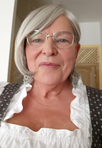A very good book!
 Honey Girl by Morgan Rogers
Honey Girl by Morgan RogersMy rating: 5 of 5 stars
I will start by saying, that Honey Girl is a very good book.
The theme, though, would also make a pretty good topic for a discussion of the general state of our society. Grace grew up dominated by values, that were already out of date at the latest in the early sixties of the 20th century. In fact, what the story turns out to revolve about is what the astrological system I use calls the Saturn return, that happens between the age of 28 and 30. For most around the 29th birthday. That is the moment we, as humans, have to ask ourselves the existential question, if what we are living is actually in accordance to who we are in our heart. For me it was the start of my transition.
Here Grace, for the first time, asks herself the question she avoided already during puberty, whether her own values are matching those, she forces herself to live by, because she craves the acceptance of her father. The fact that she has found out, that her sexuality doesn’t match general expectations, isn’t even the worst of her problems, what cripples her is the guilt she puts on herself for not being able to follow the plan her father devised for her, the expectation she has therefore developed for herself to always be the best.
In fact, this book is a heavy, to the point, criticism of our educational system, parental ignorance and the lack of understanding of the truth, that all children are born with abilities, that will still be needed, when the parents aren’t alive any more. That, by definition, means that the parents will never be able to understand those abilities, as they exceed their capability for comprehension, that they were given for the span of their lives. The result all too often is a crippling attitude towards the child, who is different than their expectations. Yet in the end it is the combination of the parents genetic heritage lines, that makes the child who the child is.
It needs a really strong willed and rebellious child to break the expected mould. In my youth it was much earlier, that you needed to become responsible. Student loans were rare, grants sometimes available for children with exceptional intellects, but most of my age group had to work just as much time as studying, if we didn’t decide for a career, that at least earned us a salary to sustain our lives for ourselves. Then, of course, there had also been the so called student revolution of the late sixties. I think we were just a rebellious generation.
Coming back to astrology and who and how we are. The inbuilt rhythm of destiny in all of us makes puberty a much more important phase than just becoming physically fertile. It is also the first time to evaluate our deepest innermost self against the values of our parent’s generation, to find out what does comply with who we are and what doesn’t. Guidance in that direction should be the focal point of the educational system for that age (between 14 and 21), not how to form useful subjects for the needs of the economic system, not to stuff the poor young people full of “learning”. What we are supposed to develop at that age is insight.
All that deficit is what Grace is struggling with and in the end it is only the help of a psychologist, that enables her to become who she truly is and find the way back to the love of her life. What does that say about our society, since it is more and more often the case in reality, too?
If you read it properly, this novel will hopefully leave you with a lot of questions about yourself and what life you want, unless you have asked yourself all of them at the age between 28 and thirty already. For me that was now more than thirty years ago.
View all my reviews
Published on April 09, 2021 09:31
No comments have been added yet.



